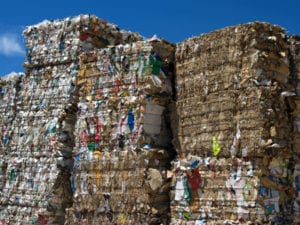In 2019, South Africa recovered 1.2 million tonnes of recyclable paper products.
Anele Sololo, general manager of RecyclePaperZA, the paper recycling association, says the country’s paper recovery rate is at 68.5%. These 1.2 million tonnes of paper and paper packaging would, when baled:- Stretch from Kempton Park to Cape Town if the bales were laid end to end.
- Fill 1 442 Olympic swimming pools.
- Cover 219 soccer pitches, one bale deep.
“We continue to work with our members, along with Fibre Circle, the producer responsibility organisation for our sector, to emphasis how important recycling is.”
Successful recycling goes far beyond putting something into a separate bin. It requires a collective effort – from producers and retailers who sell packaged products to consumers who use them, along with the recycling industry – from collectors to recycling mills. “Every company and individual in South Africa can play a part in ensuring that used paper, boxes, milk and juice cartons and paper cups get to the recycling mill and are made into new products we use every day,” says Sololo. The recycling economy not only provides an environmental service, it preserves jobs and livelihoods and provides packaging and tissue manufacturers with raw material. Sololo notes that one job is sustained for every 40 tonnes of paper recycled[i]. Tips on how you can start recycling With National Recycling Day on Friday, September 18, RecyclePaperZA asserts that now is as good a time as any to start recycling. Here are some helpful tips:- Know your recyclables – white paper, cardboard boxes, paper-based packaging of various shapes and sizes milk and juice cartons and paper cups are recyclable. Check the label if you’re not sure.
- Keep it separate – have a separate container, bag or box for your paper recycling – in your kitchen, bathroom and study.
- White paper – Avoid shredding it unless it contains very personal information as shredding shortens the fibres. Avoid crumpling used paper into a ball. Flat is best as this takes up less space!
- Milk and juice cartons – Empty the leftover liquids (you may need to rinse lightly), lift the corners and flatten. Always replace the cap or push the straw back in. This ensures that the caps and straws do not get lost into the environment.
- Take-away coffee and soft drink cups – Paper-based cups are recyclable in South Africa. Empty the leftover liquids and place in your paper recycling bin. The lids, made from high density polystyrene (like yoghurt tubs and bread tags), are also recyclable.
- Brown cardboard boxes – Flatten them or fill them with other paper recyclables on the pavement for an informal collector on refuse day.
- Pizza boxes and other food packaging – Scrape off any food residue. If the packaging is really soiled or greasy, tear off the cleaner parts and recycle those.
- Common household products – These include cereal, toothpaste and medicine packaging and can be flattened and added to your recycling bin.
- Newspapers – Keep your old news clean and dry.
- Magazines – While these are recyclable, they are less in demand by recycling mills. Consider donating age-appropriate magazines to crèches and schools.
- Egg boxes and takeaway cup holders – These paper products are recyclable, however they contain a lower grade of paper fibre and might not always be accepted by collectors. There are many other ways to make use of these such as adding them to your compost or garden or using them for paper crafts.








